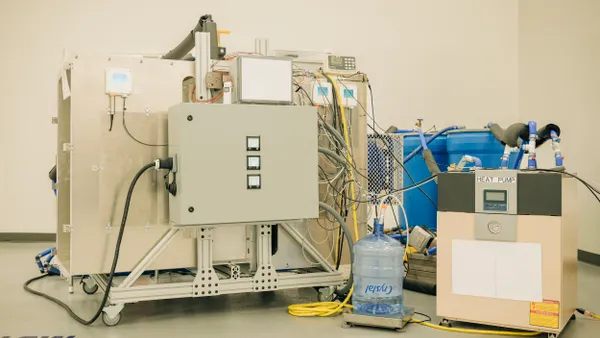Dive Brief:
- Honolulu and New York City are top-scoring U.S. cities for incorporating energy efficiency and renewable power policies into resilience plans, according to a study from the American Council for an Energy-Efficient Economy (ACEEE). They ranked "exemplary," while Atlanta, Chicago and Washington, DC followed close behind.
- The study concluded that many cities are taking steps toward cleaner energy, but only about 20% include extensive initiatives toward that end in their resilience plans. "[T]here are many missed opportunities and much room for improvement," the report says.
- Cities without strong, comprehensive energy strategies can incorporate initiatives that worked in other cities and adapt them to the local community, according to the analysis. The ideas include encouraging sustainable transportation like electric vehicles (EVs); establishing municipal building and fleet efficiency policies; creating microgrids; and requiring measures for buildings like benchmarking, retrofits and switching fuels.
Dive Insight:
Cities are responsible for 66% of global energy use and 70% of carbon dioxide emissions, the report says. They also rely on uninterrupted power flow to function well. But climate change is presenting challenges that prompt cities to examine strategies for greater energy efficiency and renewable power to increase their resilience and lessen risk to the community.
In fact, the study found that climate change was the primary driver for clean energy initiatives in community resilience planning.
ACEEE examined 66 global cities' resilience plans and energy-related efforts for this study, based on resilience plans from the now-disbanded 100 Resilient Cities. Most of the plans include at least one measure to boost energy efficiency and renewable power generation, but few include a larger, comprehensive set of initiatives.
The study ranked cities separately on energy efficiency and renewable energy, placing each city into one of four categories: exemplary, substantial, adequate or lacking. Overall, about half of the cities fell into the adequate category for energy efficiency and renewable power. Honolulu and New York were the only two U.S. cities to earn exemplary rankings in both categories, but they were joined by Chicago and Los Angeles for renewable power policies.
The cities with robust initiatives were recognized as stand-outs for launching replicable programs such as promoting transit-oriented development, developing microgrids, requiring fuel switching and implementing efficiency policies for municipal fleets or buildings.
Honolulu has responded to climate change threats with transformative policies for transportation, housing and food security. It joined 24 other cities in winning the Bloomberg Philanthropies American Cities Climate Challenge in 2018, in part for committing to use 100% renewable fuel sources for ground transportation by 2045.
Last summer, Chicago implemented a system to rate and make public large buildings' energy efficiency. Earlier in the year it also became the largest U.S. city to commit to using 100% renewable energy citywide by 2035.
Seattle is another example of the recommended concepts in action, with its commitment to transition city-owned buildings away from fossil fuels. San Jose, CA is as well, after becoming the first major U.S. city to ban natural gas infrastructure in many new residential buildings. Neither of those cities was included in the ACEEE study.
Researchers point out that emulating other cities' initiatives is not enough; program evaluation and making necessary alterations is crucial. "It is also important to monitor and review the results of these experiences to determine which initiatives are most effective, particularly because of the newness of these efforts," the report says.
An inference could be drawn from this study that many cities announce ambitious energy-related climate goals but lack concrete plans and consistent follow-through to achieve those goals. In addition, many appear to lack accountability to ensure they make good on their energy promises. These shortcomings can be improved by devising and executing comprehensive energy efficiency and renewable energy transition strategies that are included in public-facing resilience plans.
CORRECTION: A previous version of this story misstated the number of cities that won the Bloomberg Philanthropies American Cities Climate Challenge in 2018.










